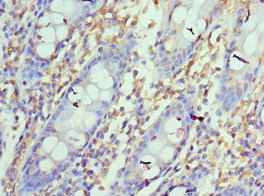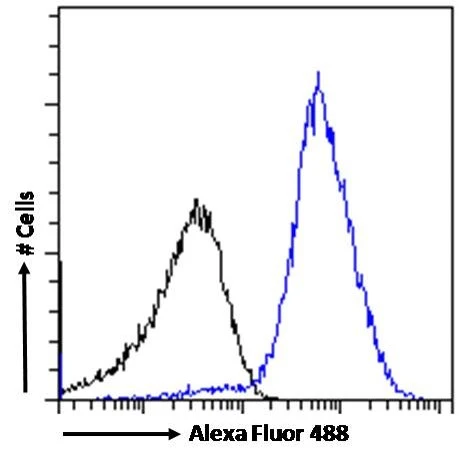PD-L1 antibody [HL1041]
GTX635975
ApplicationsFlow Cytometry, ImmunoFluorescence, Western Blot, ImmunoCytoChemistry, ImmunoHistoChemistry, ImmunoHistoChemistry Paraffin
Product group Antibodies
ReactivityHuman
TargetCD274
Overview
- SupplierGeneTex
- Product NamePD-L1 antibody [HL1041]
- Delivery Days Customer9
- Application Supplier NoteWB: 1:500-1:3000. *Optimal dilutions/concentrations should be determined by the researcher.Not tested in other applications.
- ApplicationsFlow Cytometry, ImmunoFluorescence, Western Blot, ImmunoCytoChemistry, ImmunoHistoChemistry, ImmunoHistoChemistry Paraffin
- CertificationResearch Use Only
- ClonalityMonoclonal
- Clone IDHL1041
- Concentration1 mg/ml
- ConjugateUnconjugated
- Gene ID29126
- Target nameCD274
- Target descriptionCD274 molecule
- Target synonymsADMIO5, B7-H, B7H1, PD-L1, PDCD1L1, PDCD1LG1, PDL1, hPD-L1, programmed cell death 1 ligand 1, B7 homolog 1, CD274 antigen, PDCD1 ligand 1
- HostRabbit
- IsotypeIgG
- Protein IDQ9NZQ7
- Protein NameProgrammed cell death 1 ligand 1
- Scientific DescriptionThis gene encodes an immune inhibitory receptor ligand that is expressed by hematopoietic and non-hematopoietic cells, such as T cells and B cells and various types of tumor cells. The encoded protein is a type I transmembrane protein that has immunoglobulin V-like and C-like domains. Interaction of this ligand with its receptor inhibits T-cell activation and cytokine production. During infection or inflammation of normal tissue, this interaction is important for preventing autoimmunity by maintaining homeostasis of the immune response. In tumor microenvironments, this interaction provides an immune escape for tumor cells through cytotoxic T-cell inactivation. Expression of this gene in tumor cells is considered to be prognostic in many types of human malignancies, including colon cancer and renal cell carcinoma. Alternative splicing results in multiple transcript variants. [provided by RefSeq, Sep 2015]
- ReactivityHuman
- Storage Instruction-20°C or -80°C,2°C to 8°C
- UNSPSC12352203
References
- Abdo M, Belloum Y, Heigener D, et al. Comparative evaluation of PD-L1 expression in cytology imprints, circulating tumour cells and tumour tissue in non-small cell lung cancer patients. Mol Oncol. 2023,17(5):737-746. doi: 10.1002/1878-0261.13415Read this paper
- Omenai SA, Ajani MA, Okolo CA. Programme death ligand 1 expressions as a surrogate for determining immunotherapy in cervical carcinoma patients. PLoS One. 2022,17(2):e0263615. doi: 10.1371/journal.pone.0263615Read this paper




![IHC-P analysis of human lung tissue using GTX57193 PD-L1 antibody [IHC411]](https://www.genetex.com/upload/website/prouct_img/normal/GTX57193/GTX57193_20180619_IHC-P_w_23061123_830.webp)
